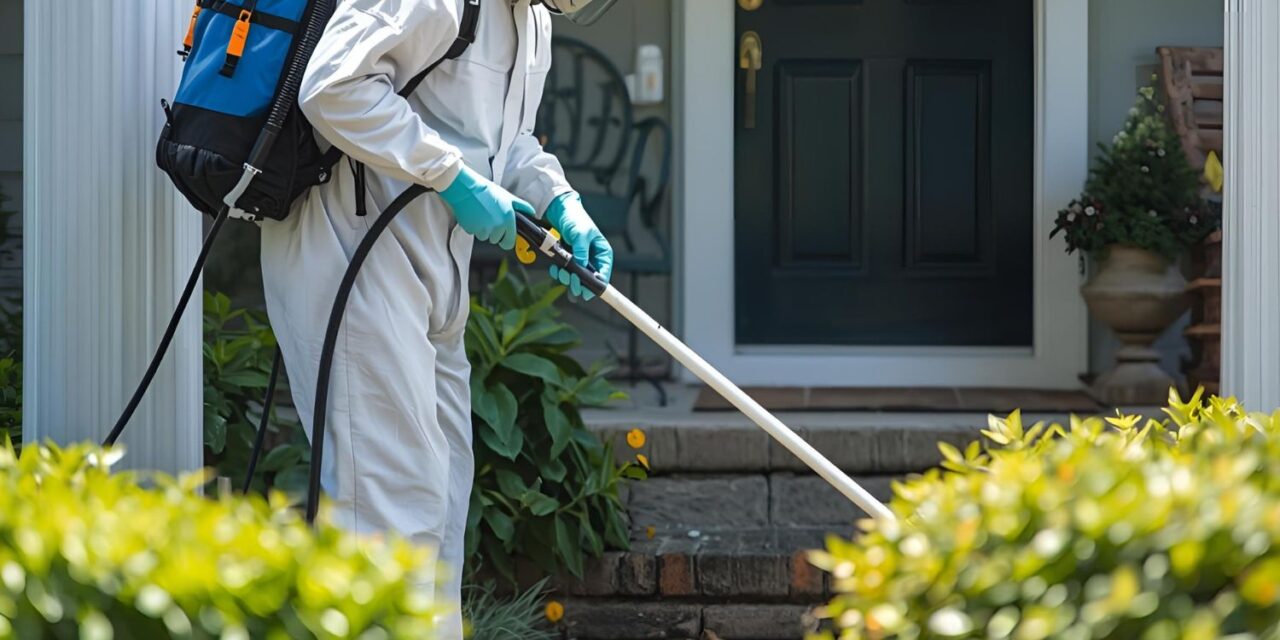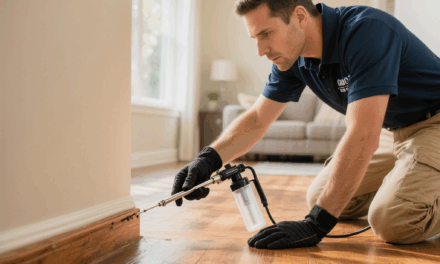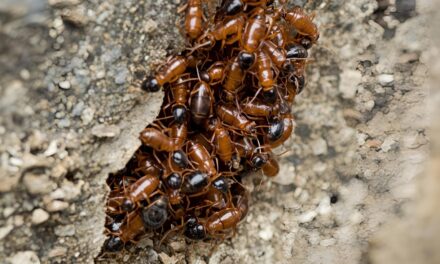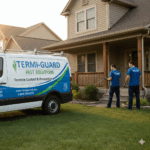Estimated reading time: 14 minutes
Key Takeaways
-
- Pests in Delhi NCR pose significant threats to businesses: public health risks, economic losses, reputation damage, and regulatory non-compliance.
-
- Integrated Pest Management (IPM) for businesses offers a smart, sustainable, and long-term solution, moving beyond quick chemical fixes.
-
- Delhi NCR faces unique challenges, including prevalent termites and common urban pests like cockroaches, rodents, and mosquitoes, exacerbated by climate, urbanization, and waste management.
-
- IPM focuses on prevention, monitoring, and targeted, eco-friendly treatments, leading to reduced chemical exposure, long-term effectiveness, and cost savings.
-
- Choosing the right pest control partner means looking for professionalism, IPM expertise, local knowledge, comprehensive solutions (like combined termite and pest treatment Noida), and transparent practices.
- Investing in professional termite and pest control services Delhi NCR is crucial for business health, reputation, and long-term profitability.
Table of contents
Pests are a silent threat that many businesses underestimate. In busy urban centres like Delhi NCR, these tiny invaders can cause huge problems. They threaten your building, your products, and even the health of your staff and customers. It’s not just about spraying chemicals when you see a problem. Truly effective termite and pest control services Delhi NCR are about smart, long-term protection for your business.
Businesses all over Delhi NCR, including rapidly growing areas like Noida and Gurgaon, face special challenges. These bustling cities offer many places for pests to hide and find food. This means ordinary pest control might not be enough. You need specific solutions tailored to your unique business needs and the local environment.
This guide will look closely at the serious problems pests create for businesses. We will then introduce you to integrated pest management for businesses – a modern and smart way to deal with pests. We’ll also talk about the specific pest challenges faced in our region. Finally, we’ll explain why comprehensive pest control solutions Gurgaon and combined termite and pest treatment Noida are essential. Investing in these services is key for your business’s success, safety, and good name.
2. The Urgent Need: Why Pests are a Major Threat to Delhi NCR Businesses
Pests are not just annoying. They are a significant danger to any business operating in a busy area like Delhi NCR. Ignoring them can lead to serious problems that cost a lot of money and damage your reputation. Let’s look at why these small creatures pose such a big threat. Getting integrated pest management for businesses right is critical.
2.1 Public Health Risks
Pests are tiny carriers of big diseases. Rodents (like rats and mice), cockroaches, mosquitoes, and flies can carry germs that make people very sick. They can spread these germs onto food, kitchen surfaces, work equipment, and even your products.
Think about the specific diseases they can bring:
- Salmonellosis: Often spread by rodents and cockroaches, it causes severe food poisoning.
- E. coli infections: Another common foodborne illness linked to unhygienic conditions.
- Leptospirosis: A serious bacterial infection spread through the urine of infected animals, especially rats.
- Dengue and Malaria: Mosquitoes spread these, and even a small amount of standing water near your business can become a breeding ground.
These health risks directly endanger your employees and customers. If an outbreak happens because of pests, your business could face big problems. This includes large government fines, legal action, and even temporary closure. This is especially true for businesses that handle food, offer hospitality services (like hotels and restaurants), or work in healthcare. These sectors must maintain the highest levels of hygiene. Without proper control, these disease-carrying pests, also known as disease vectors, can quickly turn a minor nuisance into a public health crisis. Protecting people from these health hazards is a cornerstone of responsible business operation.
The World Health Organization (WHO) constantly reminds us how pests spread diseases. They highlight the importance of controlling these disease vectors to protect public health. Their guides on environmental health and diseases spread by insects and animals clearly show the serious health dangers that come from not managing pests well. (Source: WHO publications on environmental health and vector-borne diseases)
2.2 Economic Losses
Pests don’t just make people sick; they also cost businesses a lot of money. The damage can be direct, like pests eating through things, or indirect, like stopping your business from working properly. Effective termite and pest control services Delhi NCR help prevent these losses.
Let’s talk about direct damage:
- Termites: These tiny insects are famous for eating wood. They work silently and can destroy wooden furniture, building structures, important documents, and stored goods. This leads to very expensive repairs and the need to replace valuable items. Dealing with these structural pests often requires specialized termite treatment.
- Rodents: Rats and mice love to chew. They damage electrical wires, which can cause power outages and even fires. They also tear through packaging and contaminate food supplies, making them unsafe to use or sell. This rodent management is essential to protect your assets.
- Cockroaches: They contaminate food, packaging, and surfaces, making products unusable. They also leave behind droppings and foul odours, further diminishing the quality of goods.
Indirect damage also hits your wallet:
- Operational Disruptions: If you have a severe pest problem, your business might have to close temporarily. This means you lose money because you can’t serve customers.
- Failed Inspections: If health inspectors find pests, your business could fail its inspection. This can lead to fines and even force you to stop operations until the problem is fixed.
- Decreased Productivity: Employees might feel uncomfortable or unsafe in an environment with pests, leading to lower morale and less work getting done.
- Increased Operational Costs: You’ll spend more money on cleaning, repairs, and eventually, more intensive pest control treatments if the problem gets out of hand.
For example, businesses that require combined termite and pest treatment Noida often prevent much larger costs down the line. Studies by various pest control industry groups often show that businesses lose billions of dollars each year because of pest damage and the related expenses. This highlights how crucial professional pest management is. (Source: Principles from National Pest Management Association – NPMA reports)
2.3 Reputation Damage
In today’s world, a business’s reputation is everything. A single pest sighting by a customer can have a devastating effect. People are quick to share their bad experiences, especially online. This can include negative online reviews, complaints spread by word-of-mouth, and even posts on social media. This is why comprehensive pest control solutions Gurgaon are vital for maintaining a strong brand image.
Here’s how reputation damage unfolds:
- Negative Reviews: A customer seeing a cockroach in a restaurant or a mouse in a retail store will likely leave a bad review. These reviews stay online for a long time and can scare away many potential customers.
- Word-of-Mouth: People talk. A bad experience with pests spreads quickly among friends, family, and colleagues, deterring others from visiting your establishment.
- Social Media Exposure: Photos or videos of pests can go viral, causing immense harm to your brand in a very short time. Once a video is online, it’s almost impossible to remove.
The consequence of this damage is severe:
- Deterring Potential Customers: If people think your business isn’t clean or safe, they won’t come. This leads to fewer visitors and fewer sales.
- Declining Sales: Fewer customers mean less revenue. This can severely impact your business’s ability to grow and even survive.
- Long-Term Brand Erosion: Over time, repeated pest problems can permanently damage your brand’s image. It becomes known as “the place with pests,” which is very hard to recover from.
This is especially critical for businesses where customers expect high levels of hygiene. Think about restaurants, hotels, retail stores, and even offices where clients visit. Cleanliness is not just a bonus; it’s a basic expectation. Businesses and marketing experts often point out how important cleanliness and a good customer experience are for how people see your brand. Surveys on customer satisfaction frequently show that hygiene is one of the most important things customers look for. (Source: Business and marketing journals/surveys on customer satisfaction and brand perception)
2.4 Regulatory Compliance
Many industries in Delhi NCR must follow strict rules about health, safety, and hygiene. These rules often include specific requirements for pest control. Not following these rules can lead to severe penalties. This makes professional termite and pest control services Delhi NCR a must-have, not just a nice-to-have.
Industries with strict regulations include:
- Food Processing and Manufacturing: Businesses that make or package food must ensure no pests contaminate their products.
- Pharmaceuticals: Drug manufacturing and storage facilities need to be completely pest-free to prevent contamination and ensure product safety.
- Healthcare Facilities: Hospitals, clinics, and labs must maintain sterile environments, making pest control absolutely critical.
- Hospitality: Hotels, restaurants, and cafes are constantly inspected for hygiene standards, including pest management.
- Warehousing and Logistics: Storage facilities for various goods need to protect their inventory from pest damage and contamination.
The consequences of not complying with these rules are serious:
- Failed Inspections: Health and safety authorities conduct regular inspections. If they find pest activity or inadequate pest management, your business will fail the inspection.
- Fines: Non-compliance almost always results in hefty financial penalties.
- Legal Action: In severe cases, authorities might take legal action against your business or its owners.
- Forced Business Closure: For serious or repeated violations, the ultimate consequence can be the temporary or permanent closure of your business. This stops all operations and revenue.
For example, the Food Safety and Standards Authority of India (FSSAI) has clear rules for commercial businesses about pest control. Many state-level public health laws also state that businesses must manage pests. These rules often spell out what happens if businesses don’t follow them. (Source: FSSAI guidelines and state-level public health ordinances) Ensuring compliance through professional pest management protects your business from legal and financial setbacks.
3. Integrated Pest Management (IPM): The Smart, Sustainable Solution for Businesses
When it comes to protecting your business from pests, simply spraying chemicals isn’t the best or safest long-term answer. The modern, intelligent approach is called Integrated Pest Management, or IPM. This strategy is much more effective and sustainable for integrated pest management for businesses.
3.1 What is IPM?
Integrated Pest Management (IPM) is a smart, common-sense way to manage pests. It looks at the whole “ecosystem” of your business environment. Instead of just reacting to pests after they appear, IPM focuses on preventing them in the first place. It aims for long-term protection, not just a quick fix. A key part of IPM is using many different techniques together, and only using chemical pesticides when absolutely necessary, and in the safest way possible.
The main ideas behind IPM are:
- Understanding Pests: It’s vital to know about the pests you’re dealing with – how they live, what they eat, and where they like to hide. This knowledge helps you stop them more effectively.
- Preventing Infestations: IPM focuses heavily on making your business unattractive to pests. This means removing their food, water, and shelter.
- Monitoring Pest Populations: Regular checks help to spot pest problems early, before they become big issues.
- Using Targeted, Least-Toxic Treatments: If treatments are needed, IPM chooses the safest and most effective options. It avoids widespread spraying of strong chemicals. Treatments are used precisely where they are needed, following clear guidelines to minimise any impact on people or the environment.
Both the Environmental Protection Agency (EPA) of the United States and the FAO (Food and Agriculture Organization of the United Nations) strongly support and define IPM. They provide guidelines that are recognised around the world. (Source: EPA and FAO publications on IPM) This global recognition shows that IPM is a well-researched and proven method for effective and responsible pest control.
3.2 Key Components of Commercial IPM
For businesses, a successful IPM program involves several key steps. These steps work together to create a robust defence against all kinds of pests. These components are essential for delivering truly comprehensive pest control solutions Gurgaon and for ensuring combined termite and pest treatment Noida is effective.
-
- Inspection and Identification:
- This is the first and most critical step. A pest control expert will carefully inspect your business premises. They look for signs of pests, their entry points, and where they might be living.
- They also identify the exact type of pest. Knowing if it’s a German cockroach or an American cockroach, for instance, changes how you deal with it. Correct identification is crucial for effective combined termite and pest treatment Noida because different termite species require different treatment approaches. This accurate identification allows for a precise and powerful strategy.
- Inspection and Identification:
-
- Monitoring:
- After the initial inspection, regular monitoring takes place. This might involve placing traps (like glue boards for rodents or insect traps) or simply visual inspections.
- Monitoring helps to track pest activity over time. It shows if populations are growing or shrinking and helps to evaluate if the control methods are working. This ongoing observation is like an early warning system.
- Monitoring:
-
- Action Thresholds:
- Before any major intervention, a business and its pest control partner agree on an “action threshold.” This is the acceptable level of a particular pest. For some businesses, like a hospital, the threshold might be zero pests. For others, a very small number might be tolerable.
- Treatments or intensified prevention are only triggered when pest levels go above this agreed threshold. This prevents unnecessary interventions and ensures minor issues don’t become big problems.
- Action Thresholds:
-
- Preventative Measures:
- These are the backbone of IPM and are often non-chemical tactics. They aim to make your business an unwelcoming place for pests.
- Sanitation: This means keeping everything extremely clean. Removing food crumbs, spills, standing water, and properly storing waste in sealed bins eliminates what pests need to survive. Good hygiene practices are non-negotiable.
- Exclusion: This involves blocking pests from getting into your building. Sealing cracks in walls, patching holes, fixing broken screens, and ensuring doors seal properly stops pests from entering. This pest proofing creates a physical barrier.
- Cultural Practices: This refers to changing how you operate your business slightly to make it less appealing to pests. For example, rotating stock regularly, keeping storage areas tidy, or trimming overgrown vegetation near the building.
- These are the backbone of IPM and are often non-chemical tactics. They aim to make your business an unwelcoming place for pests.
- Preventative Measures:
-
- Targeted Treatments:
- If preventative measures aren’t enough and pest levels cross the action threshold, then treatments are applied.
- IPM always chooses the least toxic and most effective methods first. This might mean using bait stations for rodents or cockroaches, applying gel baits directly into cracks and crevices, or using insect growth regulators that stop pests from reproducing.
- Pesticides are used precisely, not sprayed broadly. This minimises any impact on people, pets, and the environment. This careful, measured approach is what makes comprehensive pest control solutions Gurgaon truly effective and responsible.
- Targeted Treatments:
- Evaluation and Documentation:
- An IPM plan is not a “set it and forget it” solution. It requires continuous checking and adjustment.
- The pest control team regularly assesses how well the plan is working. They might change strategies based on monitoring results.
- Meticulous records are kept. These documents show what pests were found, when and where treatments were applied, and what preventative steps were taken. This helps track progress and ensures compliance with regulations.
Many universities and professional pest management groups around the world offer detailed guidance and training on how to put these IPM steps into practice for different business types. (Source: University extension services and professional pest management associations)
3.3 Benefits of IPM for Commercial Settings
Implementing an integrated pest management for businesses strategy offers a wealth of advantages over traditional, reactive pest control. These benefits make it the smart choice for any forward-thinking commercial establishment, especially for termite and pest control services Delhi NCR.
-
- Reduced Chemical Exposure:
- Because IPM focuses on prevention and uses targeted, least-toxic treatments only when needed, it significantly lowers the amount of chemical pesticides used.
- This is safer for your employees, your customers, and the wider environment. It creates a healthier indoor air quality and workspace.
- Reduced Chemical Exposure:
-
- Long-Term Effectiveness:
- IPM addresses the root causes of pest problems, not just the symptoms. By eliminating food, water, and harborage, and blocking entry points, it provides sustainable pest management.
- This leads to fewer recurring infestations and more stable, long-lasting control compared to treatments that only kill existing pests.
- Long-Term Effectiveness:
-
- Cost-Effectiveness:
- While initial setup might involve a thorough assessment, IPM often proves more cost-effective in the long run.
- By preventing costly damage (from termites, rodents, etc.) and reducing the need for repeated, expensive chemical treatments, businesses save money. This makes it an intelligent investment for termite and pest control services Delhi NCR.
- Cost-Effectiveness:
-
- Regulatory Compliance:
- Many health and safety regulations, especially in sensitive industries, prefer or even mandate IPM approaches due to their effectiveness and reduced chemical reliance.
- Implementing IPM helps your business easily meet and often exceed these important compliance standards, avoiding fines and legal issues.
- Regulatory Compliance:
-
- Enhanced Reputation:
- Adopting an IPM approach demonstrates your business’s commitment to high standards of hygiene, safety, and environmental responsibility.
- This positive image can significantly boost customer confidence and satisfaction, strengthening your brand’s reputation as a clean and responsible establishment.
- Enhanced Reputation:
- Minimal Disruption:
- Because IPM focuses on proactive measures and precise treatments, there’s less need for widespread spraying or extensive interventions.
- This means less disruption to your daily business operations, allowing you to continue serving customers without major interruptions.
Government health departments and environmental agencies regularly publish documents that support IPM. They highlight its benefits for health, safety, and the environment, especially in important places like schools, hospitals, and food businesses. (Source: Government health departments and environmental agencies publications) Choosing IPM is choosing a smarter, safer future for your business.
4. Specific Pest Challenges in the Delhi NCR Urban Context
The Delhi NCR region is a vibrant and growing urban area, but its unique characteristics also create a perfect environment for a variety of pests. Understanding these specific challenges is key to effective pest management in Noida and Gurgaon.
4.1 Prevalence of Termites in India
Termites are a particularly widespread and destructive problem in India, and the Delhi NCR region is no exception. This makes termite and pest control services Delhi NCR especially critical for businesses.
- Regional Context: India’s climate, especially the warm and often humid conditions in Delhi NCR, provides ideal conditions for termites to thrive and multiply. They are an endemic problem, meaning they are naturally found almost everywhere.
- Species and Impact: The most common species found in our region are subterranean termites. These termites live in large colonies underground and build mud tubes to travel silently into buildings. They feed on cellulose, which is found in wood, paper, fabrics, and even plasterboard.
- They pose a major threat to the structural integrity of commercial buildings by silently weakening wooden beams, doorframes, and window sills.
- They destroy furniture, cabinets, and fixtures.
- Crucially, they can also damage important documents, files, and stored inventory, leading to significant financial losses. Early detection and termite treatment are paramount to protect these assets.
Research from Indian agricultural universities, such as the Indian Agricultural Research Institute (IARI), and various entomology departments often publish detailed studies on termites. These studies cover their distribution, how to identify different species, and how much damage they cause across India, clearly showing how common and destructive termite problems are. (Source: IARI research papers and entomology departments)
4.2 Common Urban Pests in Delhi NCR
Beyond termites, Delhi NCR, Noida, and Gurgaon are home to a variety of other urban pests that businesses must contend with. These pests can rapidly infest commercial properties due to the density of urban living and the constant availability of resources.
-
- Cockroaches (German, American):
- These insects are incredibly adaptable and reproduce very quickly in urban settings. They are drawn to places with plenty of food, water, and dark hiding spots.
- Commercial kitchens, food storage areas, drainage systems, and even office pantries are prime locations for them.
- They are significant disease vectors, carrying bacteria and pathogens that can cause food poisoning, allergies, and asthma. Their presence is a major sign of poor hygiene and can ruin a business’s reputation.
- Cockroaches (German, American):
-
- Rodents (Rats, Mice):
- Rats and mice are found everywhere in urban areas. They are attracted to food waste, accidental spills, and the warmth and shelter offered by commercial buildings.
- They cause extensive property damage by gnawing on electrical wires, plumbing, and building materials, which can lead to fires or floods.
- They contaminate vast amounts of food and surfaces with their urine, droppings, and fur.
- Rodents also transmit serious diseases like leptospirosis and hantavirus. Effective rodent control is essential.
- Rodents (Rats, Mice):
-
- Mosquitoes:
- While often thought of as an outdoor pest, mosquitoes can be a problem on or near commercial premises. Any standing water – even small amounts in potted plants, clogged drains, or discarded containers – can become a breeding ground.
- During the monsoon season, their populations explode. They impact employee health and comfort, carrying diseases like dengue fever and chikungunya.
- Their bites can also deter customers from outdoor seating areas or make visiting your business uncomfortable.
- Mosquitoes:
- Other Nuisance Pests:
- Ants: These common invaders are always searching for food and can quickly infest food preparation areas or office spaces, making them unhygienic.
- Flies: Attracted to waste and food, flies can spread germs and are a major nuisance, especially in food service establishments.
- Stored Product Pests: Insects like weevils or moths can infest stored grains, spices, or packaged goods, causing spoilage and financial losses.
Reports from local municipal bodies, such as the MCD (Municipal Corporation of Delhi), on public health initiatives and disease control regularly detail how common vector-borne diseases are and how important it is to control the pests that spread them. Public health warnings during disease outbreaks, like dengue or chikungunya, frequently stress the need to reduce pest breeding sites and control pests. (Source: MCD reports, public health advisories during outbreaks like dengue/chikungunya)
4.3 Contributing Factors in Delhi NCR
Several unique environmental and urban development factors in Delhi NCR contribute to the high prevalence of pests. Businesses in Noida and Gurgaon must understand these factors to implement truly effective integrated pest management.
-
- Climate:
- The Delhi NCR region experiences a tropical climate with hot summers and a pronounced monsoon season.
- The warm temperatures throughout much of the year, combined with the high humidity during and after the monsoon, create ideal conditions for pest breeding. Pests like mosquitoes, cockroaches, and termites thrive in these warm, moist environments, accelerating their life cycles and population growth.
- Climate:
-
- Urbanization and Construction:
- Rapid and often unplanned urban development and construction activities are constant in Delhi NCR.
- Construction sites can disturb existing pest habitats, forcing pests to seek new shelter in nearby commercial buildings.
- New buildings might have cracks, gaps, or incomplete sealing, providing numerous entry points and harborage sites for pests before they are even fully occupied. This also contributes to the urban heat island effect, which can further benefit certain pest species.
- Urbanization and Construction:
-
- Waste Management:
- Inconsistent or inadequate waste management practices in some areas of Delhi NCR create abundant food sources and breeding grounds for pests.
- Open dumpsters, overflowing bins, and improper disposal of food waste attract rodents, flies, and cockroaches, allowing their populations to flourish and spread to nearby businesses. Effective waste segregation and disposal are crucial for pest prevention.
- Waste Management:
- High Density:
- The sheer density of commercial and residential establishments packed closely together in Delhi NCR, Noida, and Gurgaon allows for quick and easy pest migration.
- Pests can move from one building to another through shared walls, drainage systems, or even simply by walking across short distances. This interconnectedness means that a pest problem in one establishment can quickly become a problem for its neighbours.
Urban planning studies, environmental reports, and public health documents specific to Indian cities often discuss these complex challenges. News articles from trusted Indian media outlets, such as The Hindu, Times of India, and Indian Express, frequently report on public health crises that are linked to pest issues. (Source: Urban planning studies, environmental reports, and reputable Indian media outlets) Addressing these broader environmental factors, in addition to on-site management, is part of a holistic approach.
5. Choosing the Right Pest Control Partner for Your Business
Protecting your business from pests is a serious matter, and it requires more than just a quick fix. You need a trusted partner who truly understands integrated pest management for businesses. Choosing the right provider for termite and pest control services Delhi NCR is a critical business decision.
Here’s what to look for when selecting your pest control partner:
- Professionalism and Experience: Always look for a provider with a proven track record of serving commercial clients in Delhi NCR, Noida, and Gurgaon. Experience means they understand the unique challenges of different business types and local pest behaviour.
- Integrated Pest Management (IPM) Approach: Do not settle for companies that only offer generic spraying. Demand a partner who explicitly offers an integrated pest management for businesses approach. This means they focus on prevention, monitoring, and targeted, eco-friendly treatments, not just broad chemical applications. This holistic approach is more sustainable and effective in the long run.
- Local Expertise: Ensure your chosen provider has specialists who deeply understand local conditions and the specific pest challenges in Delhi NCR, Noida, and Gurgaon. They should be familiar with common regional pests, climate impacts, and local regulations.
- Comprehensive Solutions: Look for a provider that offers combined termite and pest treatment Noida and comprehensive pest control solutions Gurgaon. This ensures that all potential pest threats—from destructive termites to common urban pests like rodents and cockroaches—are covered under one strategic plan. A unified strategy is always more effective than fragmented services.
- Certifications and Training: Verify that the company’s technicians are highly trained, certified, and knowledgeable in the latest pest control techniques and safety protocols. They should be able to clearly explain their methods and why they are effective.
- Eco-Friendly and Safe Practices: A good pest control partner will prioritise the health and safety of your employees, customers, and the environment. They should use eco-friendly pest control solutions and minimal chemical interventions where possible, aligning with IPM principles.
- Proactive Monitoring and Reporting: The best providers offer ongoing monitoring and detailed reporting. This helps you track progress, comply with regulations, and ensure the pest management plan remains effective over time.
- Customer Support and Responsiveness: A reliable partner will offer excellent customer service, responding quickly to your concerns and emergency situations.
By carefully considering these factors, you can choose a pest management partner who will provide effective termite and pest control services Delhi NCR. This investment will safeguard your business’s health, reputation, and long-term profitability in Delhi NCR, Noida, and Gurgaon.
6. Conclusion
Pests are more than just a nuisance for businesses in the bustling Delhi NCR region. They pose significant threats to public health, cause substantial economic losses, damage hard-earned reputations, and can lead to serious regulatory issues. Ignoring these silent invaders is a risk no business can afford to take.
The smart, sustainable solution is proactive and integrated pest management for businesses. This modern approach focuses on understanding pest behaviour, preventing infestations, and using targeted, environmentally responsible methods. It’s about creating a long-term defence, not just reacting to a crisis. For businesses operating in Delhi NCR, Noida, and Gurgaon, understanding and addressing specific regional pest challenges, especially the prevalent termite problem, is non-negotiable.
Don’t wait for pests to damage your operations, threaten your staff and customers, or tarnish your brand. Take decisive action now. Invest in professional termite and pest control services Delhi NCR that provide comprehensive pest control solutions Gurgaon and combined termite and pest treatment Noida. This strategic investment is vital to safeguard your business’s future, ensuring its hygiene, profitability, and excellent reputation for years to come. Secure your business, secure your success.
Frequently Asked Questions
-
- Q: Why is integrated pest management (IPM) better than traditional pest control for businesses?A: IPM focuses on long-term prevention and uses targeted, least-toxic treatments, reducing chemical exposure, ensuring lasting effectiveness, and often proving more cost-efficient in the long run. Traditional methods often provide only temporary relief and rely heavily on broad chemical applications.
-
- Q: What are the biggest pest threats to businesses in Delhi NCR?A: In Delhi NCR, businesses face significant threats from subterranean termites (known for structural damage), adaptable cockroaches, disease-carrying rodents, and mosquitoes (especially during monsoon season). Ants, flies, and stored product pests are also common nuisance pests.
-
- Q: How can pests affect my business’s reputation?A: A single pest sighting by a customer can lead to negative online reviews, damaging word-of-mouth, and viral social media exposure. This tarnishes your brand image, deters potential customers, leads to declining sales, and can cause long-term brand erosion, especially in industries where hygiene is paramount.
- Q: What should I look for when choosing a pest control provider in Delhi NCR?A: Look for professionalism, proven experience with commercial clients, an explicit Integrated Pest Management (IPM) approach, local expertise in Delhi NCR, comprehensive solutions (e.g., combined termite and general pest control), certified and trained technicians, eco-friendly practices, and strong customer support with proactive monitoring and reporting.










